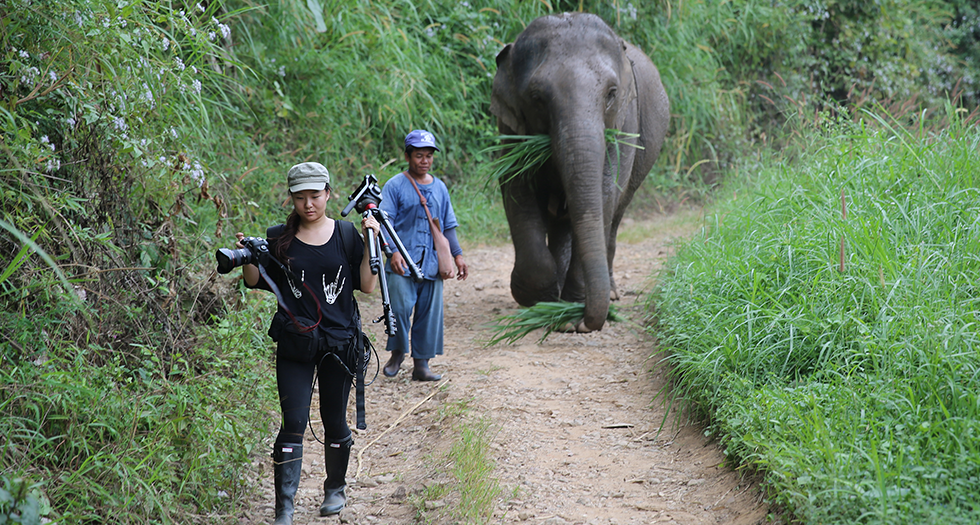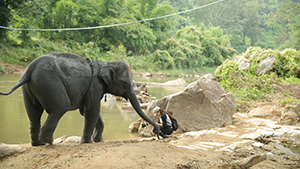SPRING 2015 / AT HOME WITH ELEPHANTS
Ya Gao and an actor on location in Thailand. (Photo courtesy Erik Boccio)
At Home With Elephants
A trip to Thailand yields award–winning
footage and a life-altering experience
BY JOCELYN Y. STEWART
L.A. Story is a regular feature showcasing how Cal State L.A. has contributed to the success of a recent graduate or soon-to-be graduate.
What Ya Gao remembers most about that first encounter is her fear—and the elephant’s thievery.
It happened at a wild animal park in Shanghai, China. A 5-year-old Gao was sitting in an open-sided van, holding an orange, ready to take a bite. Suddenly an elephant’s trunk descended and swooped up the orange.
“I was like, ‘what just happened?’” recalls Gao, a Master of Fine Arts student in Television, Film and Theatre. “I thought it was going to hurt me.”
Over the years, Gao’s fear morphed into a deep curiosity about elephants, and then an abiding passion for the creatures she describes as mysterious, intelligent, “kind of like humans.”
That passion is the force behind Thai Elephant Home, a seven-minute documentary that earned Gao top prizes in the 2014 California State University Media Arts Festival. From a field of 170 entries, representing 14 campuses, Gao’s documentary was selected as Best of Show and also received the Rosebud Award (first place) for documentary.
Filmed on location at an elephant sanctuary in Thailand, Gao’s visually stunning film explores the lives of domesticated elephants and their role in ecotourism.
The International Eco-tourism Society defines ecotourism as “responsible travel to natural areas that conserves the environment, sustains the well-being of the local people, and involves interpretation and education.”
Ecotourism and elephants were not on Gao’s mind when she left China in 2011 headed for Cal State L.A.
As a shy teenager, films were always her refuge. She’d spend hours in her room watching movies like The Truman Show. After high school Gao attended a music college in China, but her interest in film continued and landed her in Los Angeles.
At Cal State L.A., she not only learned the art of filmmaking, she found her community. “I learned so much from that entire program,” Gao says. “A lot of my classmates are just amazing people. A lot of them are professionals in the film industry.”
Creating community was a goal of faculty members who created the M.F.A. program, says Alan Bloom, a professor of film and television in the Department of Television, Film, and Media Studies. The mix of students from different disciplines and their creative exchanges mirror what students will experience in the real world. For three years Gao has been an important part of that mix.
“She’s a serious and sensitive artist and a dedicated student,” says Bloom, who chairs Gao’s thesis committee. “I’ve definitely seen her grow.”
As Gao began exploring ideas for her thesis, elephants kept coming to mind.
She was intrigued by a nagging question: “Are the proprietors of elephant camps and sanctuaries using the elephants to attract tourist dollars, or are they making money to help the elephants?”
For an elephant lover like Gao, the answer mattered—and it was more complex than she’d imagined.
In Thailand, elephants have been domesticated for thousands of years. They once played a vital role in the nation’s logging industry as transporters. But the commercial logging industry was banned in 1989, leaving behind a cadre of workers who were no longer needed, explains Gao. “That’s why many of the elephants were abandoned,” she says.
Ill-equipped to fend for themselves in the wild, the domesticated elephants need care.
Gao decided to film at Thai Elephant Home, a family-operated elephant sanctuary in the mountains of Chiang Mai province. Her crew for the 2013 visit included classmates Erik Boccio, who was the director of photography, and Heather Fipps, the B camera operator.
“We lived in a little cabin in that camp,” she says. “We’d shoot until the sun goes down. It was amazing.”
The crew met people from all over the world who’d traveled to Thailand to spend time with elephants. Those tourists generate money for elephant sanctuaries and parks.
Gao returned with footage for her documentary. She’d also found an answer to her question about ecotourism and elephants.
“I’d rather believe that they are helping elephants,” says Gao, who recently graduated. “They’re using ecotourism as a method or a means to help elephants.”
After her thesis trip, the still shy Gao made a personal discovery. Asked to show her documentary to a biology class on campus, Gao agreed. She expected to feel awkward, and nervous. But as she stood before the class talking about elephants, the words flowed smoothly from her mouth. To her surprise, she felt comfortable.
Now she has a new story to tell about her visit with elephants.
“I thought I would go there and finish my thesis,” Gao says. “I never thought it would bring so much to me.”
Thai Elephant Home from Ya Gao on Vimeo.

